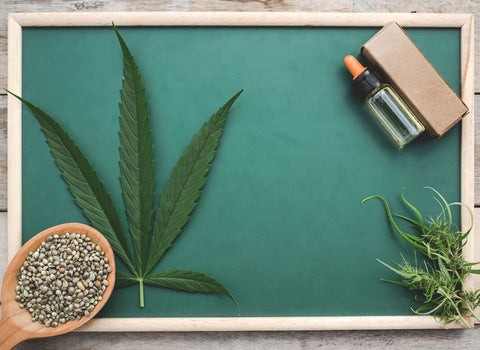
Cannabidiol (CBD) doesn't harm your liver at low doses. A 2024 study reveals CBD causes minimal liver strain, and may instead provide benefits for liver health, since “The activation of cannabinoid receptor 2 (CB2) in the liver can improve liver fibrosis caused by bile duct ligation and promote liver regeneration.”
Microdosing cannabis with precise amounts of CBD has many health benefits including lowering inflammation, reducing oxidative stress, and supporting the body's natural detox processes. You can easily access these (and more) benefits through our CBD gummies with microdoses of THC for consistent, liver-friendly results.
How long does CBD stay in your liver?
CBD typically remains in your liver for 1–2 days before being fully metabolized. The liver processes CBD through the cytochrome P450 enzyme system, breaking it down into metabolites that are then eliminated from your body.
Unlike alcohol, which can cause lasting liver damage, CBD doesn't accumulate in liver tissue long-term when used at therapeutic small doses. The liver efficiently converts CBD into water-soluble compounds for elimination without remaining in your system.
The liver processes CBD based on:
- Dosage: Higher amounts overwhelm your liver enzymes, creating a processing backlog that extends clearance time.
- Usage frequency: Regular CBD users develop enzyme induction, speeding up metabolism over time.
- Liver health: Damaged livers produce fewer metabolizing enzymes, slowing CBD breakdown.
- Food: Fat molecules bind to CBD and increase bioavailability but slow the liver's access to process it.
- Individual metabolism: Different genetic profiles of liver enzymes mean some people process CBD up to four times faster than others.
If you’re new to CBD, start with a lower dose and gradually increase as needed. Smaller amounts of cannabis give your liver the chance to efficiently process the compounds without unnecessary strain. Our Relax gummies are the perfect starter dose with 25 mg of CBD per serving, complemented by 100 mg of ashwagandha for enhanced stress relief.
“I have tried a few other brands of CBD gummies but was not impressed and noticed little effect. These truly chill me out and make me more relaxed…”
—Sara
What does CBD do to the liver?
At regular therapeutic doses, CBD does not cause liver problems for most people. It actually offers protective benefits through its interactions with many of the liver’s systems, including the endocannabinoid system (ECS). The liver contains cannabinoid receptors CB1 and CB2 that regulate metabolism, energy use, and inflammation.
CBD primarily activates CB2 receptors, which reduce inflammatory processes, while minimizing activation of CB1 receptors that could increase fat storage in liver cells. Far from causing liver damage, CBD's anti-inflammatory and antioxidant properties protect liver cells and promote healthy liver function when used responsibly.
Animal models demonstrate CBD's potential therapeutic effects against chronic liver diseases. A 2017 study found that CBD lowered alcohol-induced liver damage in mice by fighting inflammation and oxidative stress. CBD may help prevent non-alcoholic fatty liver disease by reducing lipid accumulation in liver cells through improved metabolic regulation.
In extremely high doses, CBD can temporarily elevate liver enzymes, particularly in people who take certain medications. Stick to smaller, therapeutic amounts for daily use.
What does CBD do to the liver enzymes?
CBD interacts directly with your liver's cytochrome P450 enzyme system, the same metabolic pathway that processes many medications. CBD temporarily occupies these enzymes, which can slow down the breakdown of other compounds processed through the same pathway. This interaction creates a two-way relationship: CBD affects enzymes while being metabolized by them.
In the liver, CBD competes for enzyme attention with other substances and may increase liver enzyme levels in blood tests. These elevated liver enzymes aren't a cause for concern at normal CBD doses. They're mild, temporary, and return to baseline when CBD clears from your system.
Clinical studies have demonstrated that CBD drastically reduced elevated levels of two major liver enzymes in mice with induced liver failure without affecting enzyme levels in healthy control animals, showing a normalizing rather than suppressive effect on liver function.
A 2020 study reveals CBD's pivotal role as a therapeutic target for liver disorders through its ability to regulate immune response and reduce hepatic fibrosis. These beneficial effects extend beyond enzyme regulation to include protection against potential liver injury.
No need to worry about stressing your liver and clogging the enzymes with our microdosed edibles. Our Energy gummies with only 5 mg of CBD and 2.5 mg of THC support your wellbeing while being processed efficiently by your body's natural systems.
Can CBD cause liver toxicity?
Concerns about CBD and liver damage have been popping up online, but the research says it’s hard to damage the liver with CBD alone. In mice studies, researchers had to use enormous doses (equivalent to a human taking thousands of milligrams) to see even mild toxic effects.
Stohs and Ray concluded there's a "low probability of serious hepatotoxicity" even at the high therapeutic doses used for epilepsy. At the amounts found in our microdosed gummies and cannabis-infused beverages (up to 25 mg per serving), genuine liver toxicity risk is very low.
CBD actually protects against liver toxicity. Chen and Kim explain:
CBD’s protective effect on the liver against chemical damage primarily stems from its ability to inhibit oxidative stress and apoptosis. In a CCl4-induced hepatic toxicity model, CBD significantly reduced the infiltration of T cells and macrophages.
A Scientific Reports article (2017) indicates that CBD prevented alcohol-induced liver toxicity by attenuating the elevation of liver enzymes (ALT and AST), reducing oxidative damage markers (lipid peroxidation, 3-nitrotyrosine formation), and normalizing the expression of metabolic genes.
Can CBD cause fatty liver?
Fatty liver occurs when excess fat accumulates in liver cells, typically caused by obesity, diabetes, excessive alcohol consumption, or certain medications that disrupt normal fat metabolism. Far from causing fatty liver disease, CBD can reduce fat accumulation in the liver by improving metabolic function, decreasing inflammatory responses, and restoring healthy expression of the genes involved in fat metabolism and oxidation.
According to Chen and Kim, CBD improves how the liver processes fats and increases cellular energy production. Rather than causing liver problems, these properties help fight fatty liver disease by calming the inflammation signals that would otherwise trigger fat buildup in liver cells.
Product QUIZ
Need help deciding what product is best for you? Take our quiz, just three questions until your perfect match!
How much CBD is bad for the liver?
CBD only begins to show potential liver concerns at doses above 20 mg/kg a day, which is approximately 1,400 mg for a 70 kg person. These doses far exceed normal supplemental use. Even when scientists tried to find toxic thresholds in animal studies, they needed doses equivalent to several thousand milligrams in humans.
This means that CBD has a substantial safety margin when it comes to your liver health—especially when you’re microdosing.
Studies examining daily doses found no negative effects on liver function at doses up to 200 mg daily, well above typical supplemental amounts. For patients with advanced liver disease or liver transplant recipients, lower effective doses based on body weight are subjective and should be recommended by their healthcare providers.
The newest addition to our microdosing family is the Buzz Packs™, powder THC and CBD stick packs you can mix with any liquid, hot or cold, and enjoy a simple and effective buzztail™. Each packet of Buzz Packs balance 5 mg of CBD with 5 mg of THC that work through the entourage effect to enhance therapeutic benefits.
Learn how to craft delicious THC and CBD beverages and take your cannabis game to another level.
Low-dose CBD edibles for the best liver-friendly option
Many cannabis products on the market contain contaminants such as heavy metals, pesticides, fungi, and bacteria that can harm your liver. These toxins often go undetected without proper testing and can potentially counteract the liver-protective benefits of CBD.
If you're concerned about liver health or managing other health conditions, you need clean, precisely dosed CBD products you can trust. At nama™, all our products undergo comprehensive lab testing to verify purity and exact cannabinoid content. This careful quality control means you're getting the therapeutic benefits of CBD without unwanted toxins that could stress your liver.
For those who prefer alternatives to traditional edibles, our Buzz Drops™ are another convenient way to enjoy CBD in any beverage. Simply add a dropper to your favorite drink for a precisely measured dose for a gentle, therapeutic experience.
Or try our perfectly dosed full-spectrum CBD gummies with THC, CBN, and other beneficial cannabis compounds that work together to enhance your health and bring out the good vibes without overwhelming your experience.
If you’ve been struggling with sleep lately, order our CBD sleep gummies with a touch of melatonin.
Your liver deserves the best, so choose products that protect rather than harm this vital organ. Order from nama today.
Is CBD bad for your liver FAQ
CBD doesn't "detox" the liver in the way many cleanse products claim. It supports liver function through its anti-inflammatory and antioxidant properties. It helps reduce oxidative stress and inflammation that can damage liver cells.
CBD helps regulate metabolism in the human body, particularly in those following a high-fat diet, by reducing fat accumulation that can lead to potential liver damage. Rather than a detoxifier, CBD acts as a supportive compound that helps maintain normal liver function by modulating immune cells and endothelial cells involved in liver inflammation.
While CBD is generally well-tolerated by most people, potential side effects include:
- Drowsiness and fatigue
- Dry mouth
- Reduced appetite
- Digestive discomfort
- Drug interactions (particularly with liver medications)
- Product quality concerns (unregulated products may contain contaminants)
- Rare psychoactive effects at very high doses
Observational studies indicate most effects are mild and dose-dependent. Patients with chronic hepatitis or post-liver transplantation should consult healthcare providers before use. According to Cannabis Cannabinoid Res, the pharmacodynamics of cannabinoids varies significantly between individuals, so starting with low doses and purchasing from reputable companies with third-party testing is recommended.
CBD has mild effects on the kidneys. Unlike many pain medications such as NSAIDs that can cause kidney damage, CBD hasn't shown adverse effects on kidney function at standard doses. Preclinical studies indicate CBD may have protective properties against certain types of kidney damage due to its anti-inflammatory effects.
If you have an existing kidney disease, consult your healthcare provider before using CBD. The kidneys help eliminate cannabinoids from the body, and impaired function could alter how CBD is processed.
CBD has many advantages over alcohol.
- CBD doesn’t impair your judgment or coordination. Alcohol can slow reaction times and affect decision-making, but CBD allows you to stay clear-headed and in control.
- There’s no risk of addiction. While alcohol can be habit-forming, CBD has no known potential for physical or psychological dependence.
- CBD is much easier on your body. Regular alcohol use can take a toll on the liver and other organs, but CBD doesn’t cause the same kind of damage, even with frequent use.
- With CBD, you won’t wake up with headaches, nausea, or the dreaded brain fog that often follows a night of drinking.
- Alcohol might temporarily calm nerves, but it often leads to rebound anxiety once it wears off. CBD promotes relaxation without that downside.
- CBD helps you relax without clouding your mind, allowing you to enjoy social situations or unwind at home without feeling out of it.
That said, if you're looking for the euphoric "buzz" that alcohol provides, CBD won’t deliver the same experience.
For cirrhosis patients, CBD appears to be well-tolerated and potentially beneficial at reasonable doses. CBD's anti-inflammatory properties may reduce the inflammatory processes driving cirrhosis progression. Its antioxidant effects could protect remaining healthy liver tissue from further damage. Some research indicates CBD may help reduce portal hypertension, a dangerous complication of cirrhosis.
Because cirrhosis impairs the liver's ability to metabolize compounds, start with lower doses and consult your hepatologist. CBD is not a replacement for medical treatment but might serve as a complementary approach.
Top Sellers
New? Start with our Ultimate Sampler!

THC: 10 mg | CBC: 10 mg | CBD: 10 mg | CBG: 5 mg | CBN 5mg
Resources
Chen S, Kim JK. The Role of Cannabidiol in Liver Disease: A Systemic Review. Int J Mol Sci. 2024 Feb 17;25(4):2370. doi: 10.3390/ijms25042370. PMID: 38397045; PMCID: PMC10888697.
Wang, Y., Mukhopadhyay, P., Cao, Z. et al. Cannabidiol attenuates alcohol-induced liver steatosis, metabolic dysregulation, inflammation and neutrophil-mediated injury. Sci Rep 7, 12064 (2017). https://doi.org/10.1038/s41598-017-10924-8
Avraham Y, Grigoriadis N, Poutahidis T, Vorobiev L, Magen I, Ilan Y, Mechoulam R, Berry E. Cannabidiol improves brain and liver function in a fulminant hepatic failure-induced model of hepatic encephalopathy in mice models. Br J Pharmacol. 2011 Apr;162(7):1650-8. doi: 10.1111/j.1476-5381.2010.01179.x. PMID: 21182490; PMCID: PMC3057300.
Stohs S, Ray S. Is cannabidiol hepatotoxic or hepatoprotective: A review. Toxicology Research and Application. 2020;4. doi:10.1177/2397847320922944
Rein JL. The nephrologist's guide to cannabis and cannabinoids. Curr Opin Nephrol Hypertens. 2020 Mar;29(2):248-257. doi: 10.1097/MNH.0000000000000590. PMID: 31972598; PMCID: PMC7012334.
Malinowska B, Toczek M, Pędzińska-Betiuk A, Schlicker E. Cannabinoids in arterial, pulmonary and portal hypertension - mechanisms of action and potential therapeutic significance. Br J Pharmacol. 2019 May;176(10):1395-1411. doi: 10.1111/bph.14168. Epub 2018 Apr 14. PMID: 29455452; PMCID: PMC6487561.
Further reading
Are Buzz Packs safe for the liver?
What do Buzz Drops do to the liver?
Can CBD relax me before flying?
How CBD sharpens focus and concentration
What are the side effects of Buzz Packs?
Microdosing cannabis for arthritis
nama CBD FDA & legal disclaimer
Our products are not intended to diagnose, treat, cure, or prevent any disease. They are not a replacement for prescription medications and have not been evaluated by the U.S. Food and Drug Administration (FDA).
The information provided on this website does not and is not intended to, constitute legal advice or any statement of the status of any laws. Any information, content, and materials available on this site are for general informational purposes only and are not intended to be relied upon for any purpose.
Readers of this website should contact their attorney to obtain advice with respect to any particular legal matter, including decisions on what products are, or are not, legal to sell, possess, or consume. No reader, user, or browser of this site should act or refrain from acting on the basis of the information on this site without first seeking legal advice from their own counsel in the relevant jurisdiction.
About
Learn
Join us on this journey

© Copyright 2026 nama Products LLC. All Rights Reserved.
†These statements have not been evaluated by the Food and Drug Administration. These products are not intended to diagnose, treat, cure or prevent any disease. All information presented here is not meant as a substitute for or alternative to information from health care practitioners. Please consult your health care professional about potential interactions or other possible complications before using any product.
††The information provided on this website does not, and is not intended to, constitute legal advice or any statements of the status of any laws. Any information, content, and materials available on this site are for general entertainment purposes only, and are not intended to be relied upon for any purpose.

By clicking ‘Yes,’ you agree to our
Terms & Conditions and Privacy Policy
123 John Doe Street
Your Town, YT 12345
Store Hours
Sun: Closed
Mon-Fri: 9:00 - 17:00
Sat: 10:00 - 13:00
What to expect at pickup
Closed
Closing at 5pm
Closing at 5pm
Closing at 5pm
Closing at 5pm
Closing at 5pm
Closing at 1pm

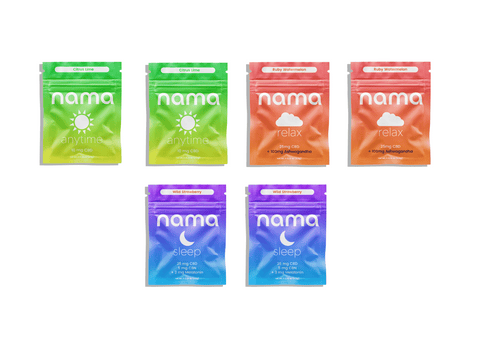
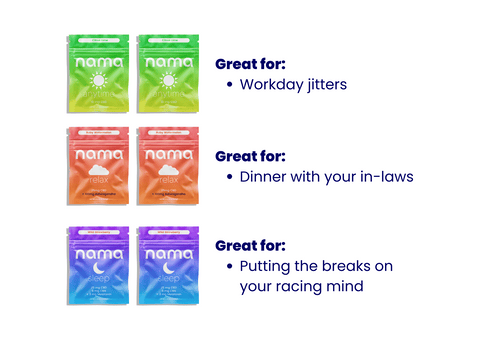
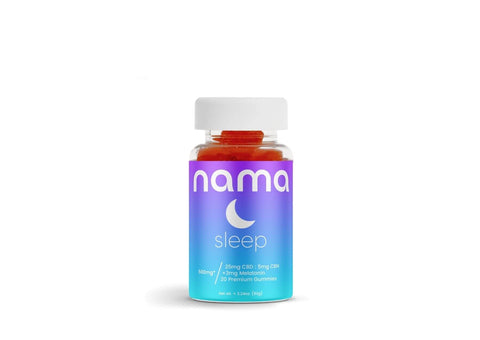
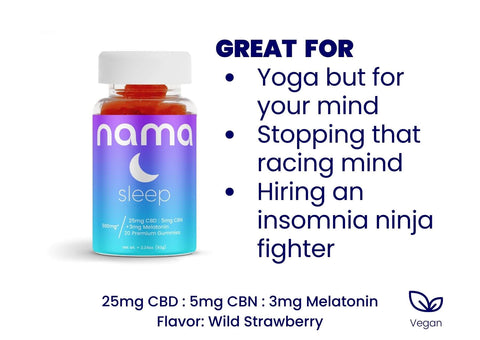
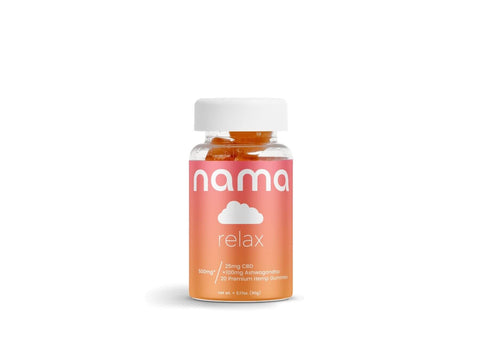
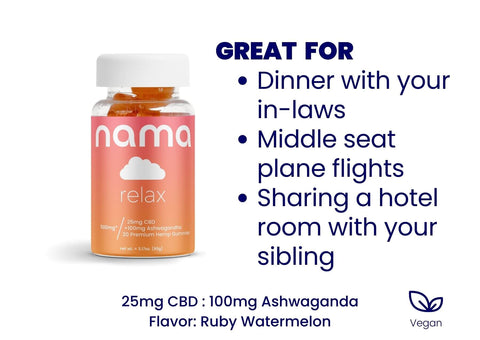
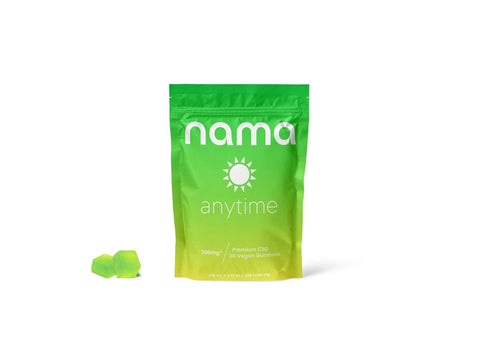
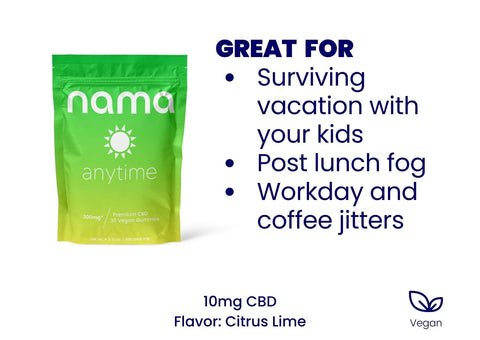
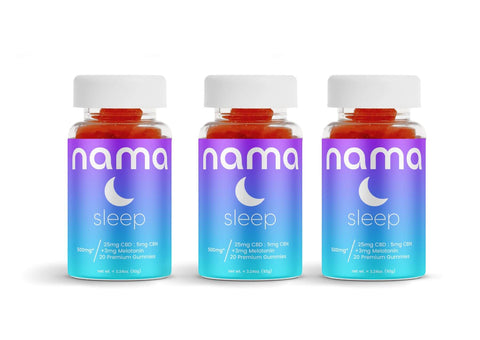
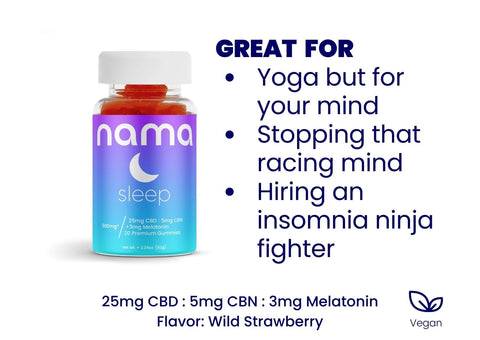
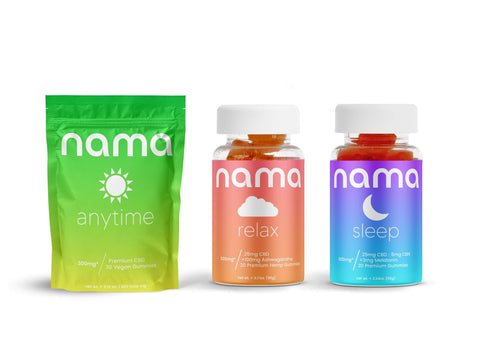
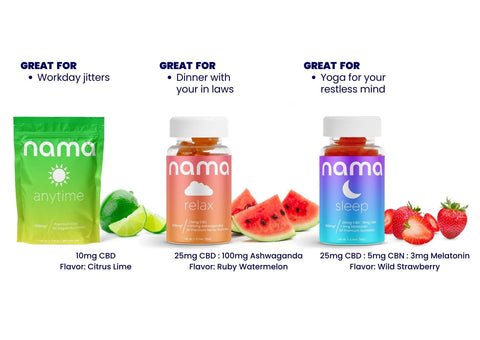








![Buzz Packs™ [THC and CBD Powder Drink Mix]](http://www.namacbd.com/cdn/shop/files/nama_buzz_packs_thc_drink_pack_white_background.png?v=1741884660&width=480)
![Buzz Packs™ [THC and CBD Powder Drink Mix]](http://www.namacbd.com/cdn/shop/files/Buzz_Packs_Label.png?v=1741884660&width=480)
![Buzz Drops™ [THC Drink Drops]](http://www.namacbd.com/cdn/shop/files/nama_thc_buzz_drops.png?v=1711412866&width=480)
![Buzz Drops™ [THC Drink Drops]](http://www.namacbd.com/cdn/shop/files/buzz-drop-wine-comparison.png?v=1736882023&width=480)
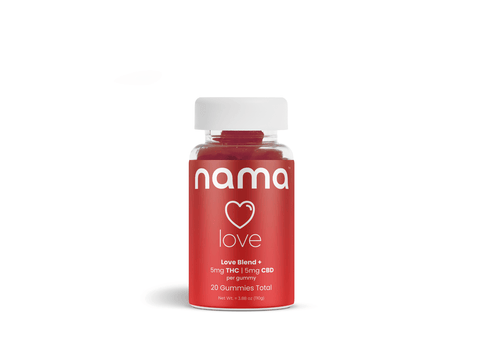
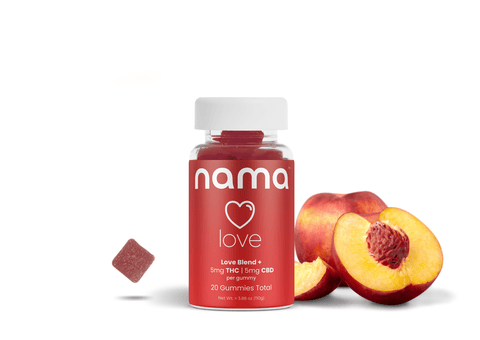





Comments (0)
There are no comments for this article. Be the first one to leave a message!